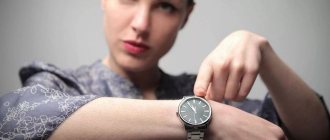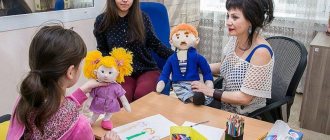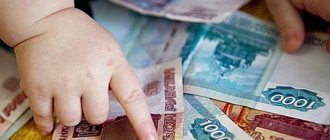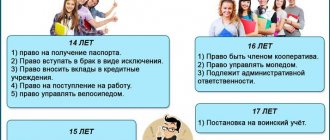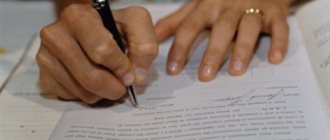What is a curfew?
A curfew is a prohibited time for being on the street or in other places at a specific time. Exceptions are granted only with special permission. The reasons for introducing the ban are:
- military operations on the territory of the country;
- mass riots;
- critical number of crimes;
- natural disasters.
During a period of peace, the restriction applies only to minors. The law establishes a period when children do not have the right to leave home on their own without adults. According to Art. 14.1 of Federal Law No. 124, constituent entities of the Russian Federation can independently establish a ban, determine its length and the age of citizens subject to restrictions.
Federal Law of July 24, 1998 No. 124-FZ “On the Basic Guarantees of the Rights of the Child in the Russian Federation”
About curfew for minors
Subjects of the Russian Federation (districts, regions and cities of federal significance) can independently determine prohibited places of stay for children and adolescents. In some of them, young people over sixteen years old and under eighteen are allowed to stay on the street until 23:00.
- determine the list of public places;
- reduce the age of adolescents in accordance with local traditions, to which it is unacceptable for them to be on the street independently;
- reduce the allowed time limit in accordance with weather and climatic conditions.
Who is covered by the ban?
The curfew for young children and minors in 2021 applies to:
- children under 7 years old cannot be on the street alone;
- teenagers aged 7-14 years must be at home after 10 pm.
On the street and in public places, these persons can be accompanied by parents or other persons who have reached the age of majority. However, this does not cancel the ban on staying outside the home from 22:00 at night to 6:00 in the morning.
On a note! Extension and reduction of time is the responsibility of local authorities.
Curfew using the example of Yaroslavl
Society's attitude to the law
Not all citizens supported such an initiative. When developing the law on prohibited time, the authorities were guided by the fact that parents would not want to pay money for their children to travel at night. Thanks to this ban, teenagers will be protected from various factors that can damage mental, moral, and spiritual development. This should reduce crime, since many illegal acts are committed at night.
Many parents believe that the law lacks some nuances. There are schoolchildren and students who have part-time jobs. Naturally, they can return home at night. Teenagers also attend educational events from which they come home late. But not all parents can meet their children.
What time is the curfew in effect?
The law establishes that children under 7 years of age must be accompanied on the street by relatives and parents . This is compliance with the rights of the child specified in the basic guarantees, which include the Constitution of the Russian Federation, Federal Law No. 124. Also on the basis of Art. 3 Federal Law No. 124, the federal authorities can adopt laws on the protection of children's rights, and the state can pass other regulations.
For teenagers aged 7-18 years, the following number of restrictions apply:
- from 7 to 16 years old - minors are allowed to be on the street or in other places without adults until 22 pm in winter and 22 pm in summer;
- from 16 to 18 years old - can stay outside for up to 23 hours, regardless of the time of year;
- from 7 to 18 years old - on New Year's Eve or on a regional holiday they can be outside with adults without restrictions. This point is determined by the municipal authorities.
How long the curfew lasts depends on regional legislation. In most cases, it ends at 6.00 am.
Curfew for children
The legislative framework
The rules of “non-children's hour” are officially enshrined in the Constitution of the Russian Federation and the Family Code. In particular, they are regulated by the Law “On Basic Guarantees of the Rights of the Child” No. 124-FZ of July 24, 1998 and Law No. 71, adopted in April 2009 and amending the previously existing document.
In Russia, the curfew for minors works as follows:
- if a child is from 7 to 16 years old, he can move freely around the city from 6 am to 10 pm in winter and from 7 am to 11 pm in summer;
- if we are talking about an older age group from 16 to 18 years old, then for such children “summer” time applies all year round. “Hour X” for them comes at 23:00, regardless of which month the calendar shows.
There is no time limit for children under 7 years of age, as they are generally prohibited from being outside without adult supervision at any time of the day or night. The only exception may be a playground located in the courtyard of the house where the child lives.
As before, in 2021, the curfew for minors vetoes the presence of young citizens not only on the streets and in the gateways of the city, but also:
- in stadiums;
- at train stations;
- in parks and squares;
- at bus stops and in public transport;
- at retail outlets;
- in entertainment centers;
- at public catering outlets, especially those with a license to sell alcohol.
Having discovered a child in one of the listed places at inopportune hours, police officers have the right to detain him, establish the identity of the youngest offender and members of his family, and then hand the teenager over to either his parents or their legal representatives.
If it is not immediately possible to transfer the detainee to the responsible persons, the child may be left in the police station building for 3 hours, after which he will be sent to the appropriate institution for minors.
Which places are prohibited from visiting?
A curfew does not only mean limiting the time spent on the street. Children are prohibited from:
- in retail outlets, entertainment centers and in the areas adjacent to them;
- in station buildings, in open and closed stadiums;
- in public parks and squares;
- on the territory of cultural and educational institutions;
- in the locations of catering outlets;
- in bookmakers and stores selling intimate goods;
- in abandoned buildings with basements or roof exits;
- at city and public transport stops.
Read also: Medical error
A special ban applies to places selling alcohol - teenagers are not allowed to be there at any time of the day or year.
Important! Without parental accompaniment at night, children can only stay at home or with relatives.
Prohibited times in other countries
It's not just Russia that enforces curfews. At age 16, teenagers and younger children must be accompanied by an adult at night in many civilized countries. The main goal of foreign legislation is to combat youth crime and child alcoholism. In the United States, in addition to the nighttime ban, there is also a daytime curfew. Schoolchildren should not be outside the educational institution during school hours. In France, the president introduced temporary restrictions for the entire population due to the dangerous situation. After a series of terrorist attacks in the capital, citizens are restricted from visiting crowded places and public events.
Who has the right to accompany children at night?
Federal Law No. 124 in 2021 establishes the need for children to be accompanied by adults. These include:
- parents or one of the parents;
- adoptive parents and guardians;
- employees of organizations where the child is in care;
- representatives of the PLO;
- citizens involved in education, upbringing, social protection, services, rehabilitation and adaptation of children.
These persons must have documents confirming their status. Parents can provide a passport or birth certificate of the child, employees of institutions can provide an order, management resolution and permission.
Important! Based on Art. and the UK, responsibility for minors rests with parents or legal representatives. Therefore, a brother or sister cannot accompany the child at night.
Article 63 of the Family Code of the Russian Federation “Rights and responsibilities of parents in the upbringing and education of children”
Article 64 of the Family Code of the Russian Federation “Rights and responsibilities of parents to protect the rights and interests of children”
What to do if you were illegally brought to administrative responsibility
Let's say a police officer has drawn up an administrative violation report against you under Part 1 of Article 5.35 of the Code of Administrative Offenses of the Russian Federation for being with your minor child at night. But subsequently you are found not guilty of committing an administrative offense due to the absence of an administrative offense event. In this case, it is possible to bring a claim against the police authority for the recovery of compensation for moral damage of a person in respect of whom the case of an administrative offense has been terminated, if there are general conditions for liability for harm caused to a citizen or legal entity as a result of illegal actions (inaction) of state bodies, local bodies self-government or officials of these bodies. Based on paragraph 1 of Art. 1099 of the Civil Code of the Russian Federation, the grounds and amount of compensation to a citizen for moral damage are determined by the rules provided for by Chapter 59 of the Civil Code of the Russian Federation and Art. 151 Civil Code of the Russian Federation. A similar court decision to satisfy claims for compensation for moral damage is the Appeal Ruling of the Moscow City Court.
Curfew violation
The law, in particular Art. 5.35 of the Administrative Code, in case of violation of the curfew provisions, determines sanctions for parents of minors or organizations. Mother and father who violated their duties to raise a child pay a fine of 500 rubles. With repeated violations, the amount of penalties increases.
Institutions that are responsible for teenagers and children not being at home at the designated time at night pay a fine for violating curfew in the amount of 10 to 50 thousand rubles. Police representatives who met an unaccompanied teenager at the indicated hour establish his identity and information about his parents. If the adults are not found, the minor will be sent to a special institution until the circumstances are clarified.
Article 5.35 of the Code of Administrative Offenses of the Russian Federation “Failure of parents or other legal representatives of minors to fulfill obligations for the maintenance and upbringing of minors”
From what time until what time is the curfew in summer?
Everyone knows that night is not the time for children to walk.
Recently, this unspoken rule has acquired legal force, because starting from 2021 in Russia, and from 2021 in Ukraine, legislation on curfews for children and adolescents began to apply. Despite some differences, the main essence of the laws of both the Russian Federation and Ukraine is the same - children and adolescents are prohibited from being in public places at night without adults: parents or legal representatives. If on the first point, regarding physical development, everything is clear, this requires the construction of playgrounds, children's cultural centers, sports sections and much more that will help the child develop, then with cultural and spiritual development everything will be much easier.
Regional features
The curfew in winter or summer differs in length and penalties for persons responsible for minors. These differences are established by regional authorities.
In Moscow
On the territory of the capital, Art.
3.12 of the City Code on administrative offenses. The document establishes that night time is the period from 11 pm to 6 am. The restriction applies to children under 18 years of age who, without legal representatives, mother or father, are in a park, on a pond, roof, attic, basement or internet cafe. The curfew also applies to educational institutions, highways, construction sites, and railways. Read also: Patients' rights
If a child is found at night in one of these places, parents are brought to administrative responsibility - a warning or a fine of 100 to 500 rubles.
If minors are detained in a restaurant, club or bar that sells alcoholic beverages, liability arises for the employees and the establishment itself. Officials are subject to a fine of 2500-5000 rubles. For legal entities, the fine is 10-30 thousand rubles. To prevent financial liability, the establishment may require documents from visitors.
Article 3.12 of the Code of Administrative Offenses of Moscow “Failure to take measures to prevent minors from being in public and other places unaccompanied by parents (persons replacing them) or persons carrying out activities with the participation of minors”
In St. Petersburg
In St. Petersburg in 2021, the standards established by city law No. 48-14 are in effect. According to them, persons under 16 years of age cannot be on the street at night, in parks, on public transport, in Internet clubs, or in places where alcoholic beverages are sold.
Law of St. Petersburg No. 48-14 also regulates:
- curfew time period. From September 1 to May 31 - from 22 to 6 o'clock, from June 1 to August 31 - until 23 o'clock;
- for teenagers aged 16 to 18 years - without parents you cannot be present in public places from 23 to 6 o'clock all year round;
- penalties for violators over 16 years old in the amount of 1000-3000 rubles;
- fine applied to parents - from 1 to 3 thousand rubles, from 3 to 5 thousand rubles. repeatedly;
- fines for individual entrepreneurs who allowed minors to the place to which the restriction applies - from 3,000 to 5,000 rubles, 5-10 thousand rubles. repeatedly;
- sanctions for legal entities for allowing their presence - from 10 to 15 thousand rubles, 15-20 thousand rubles. again.
Law of St. Petersburg dated February 19, 2014 No. 48-14 “On measures to prevent harm to the health, physical, intellectual, mental, spiritual and moral development of minors in St. Petersburg and amendments to the Law of St. Petersburg “On Administrative Offenses in St. Petersburg"
Coronavirus in Russia
The curfew in Russia is being introduced due to the coronavirus epidemic; below is a table with the number of infected people at the moment.
| Region | Infected | Died |
| Moscow | 3893 (+536) | 29 (+2) |
| Moscow region | 260 | 2 |
| Saint Petersburg | 171 | 2 |
| Komi Republic | 59 | 2 |
| Leningrad region | 47 | |
| Sverdlovsk region | 40 | |
| Krasnodar region | 39 | |
| The Republic of Buryatia | 35 | |
| Penza region | 27 | 1 |
| Chelyabinsk region | 26 | |
| Krasnoyarsk region | 25 | |
| Nizhny Novgorod Region | 25 | |
| The Republic of Dagestan | 25 | |
| Tatarstan | 25 | |
| Ivanovo region | 23 | |
| Perm region | 21 | 2 |
| Bryansk region | 19 | |
| Kaliningrad region | 19 | |
| Saratov region | 19 | |
| Tula region | 19 | |
| Kirov region | 18 | |
| Lipetsk region | 18 | |
| Republic of Crimea | 18 | |
| Samara Region | 17 | |
| Khanty-Mansi Autonomous Okrug | 16 | |
| The Republic of Sakha (Yakutia) | 15 | |
| Chechen Republic | 15 | 1 |
| Murmansk region | 15 | |
| Voronezh region | 14 | |
| Vologda Region | 13 | |
| Orenburg region | 12 | 1 |
| Ryazan Oblast | 12 | |
| Yamalo-Nenets Autonomous Okrug | 12 | |
| Tyumen region | 11 | |
| Stavropol region | 11 | |
| Khabarovsk region | 11 (+1) | |
| Novosibirsk region | 10 | |
| Omsk region | 10 | |
| Bashkortostan | 10 | |
| Pskov region | 9 | 2 |
| Rostov region | 9 | |
| Arhangelsk region | 8 | |
| Volgograd region | 8 | |
| Kabardino-Balkarian Republic | 8 | |
| Kostroma region | 8 | 1 |
| Irkutsk region | 8 | |
| Tambov Region | 7 | |
| Altai region | 7 | |
| Belgorod region | 7 | |
| Primorsky Krai | 7 | 1 |
| Republic of Adygea | 7 | |
| Republic of Kalmykia | 7 | |
| Tver region | 6 | |
| Kaluga region | 6 | |
| Oryol Region | 6 | |
| Sakhalin region | 6 | |
| Yaroslavl region | 5 | |
| Astrakhan region | 5 | |
| The Republic of Mordovia | 5 | |
| Sevastopol | 5 | |
| Udmurt republic | 5 | |
| Republic of North Ossetia-Alania | 5 | |
| Amur region | 4 | |
| Kursk region | 4 | |
| Mari El Republic | 4 | |
| Chuvash Republic | 4 | |
| The Republic of Khakassia | 3 | |
| Tomsk region | 3 | |
| Vladimir region | 3 | 1 |
| Jewish Autonomous Region | 3 | |
| Kemerovo region | 3 | |
| Novgorod region | 3 | |
| Transbaikal region | 2 (+1) | |
| Kurgan region | 2 | |
| Smolensk region | 2 | |
| Kamchatka Krai | 2 (+2) | |
| Magadan Region | 1 | |
| Ulyanovsk region | 1 | |
| The Republic of Ingushetia | 1 | |
| TOTAL: | 5274 | 45 |
